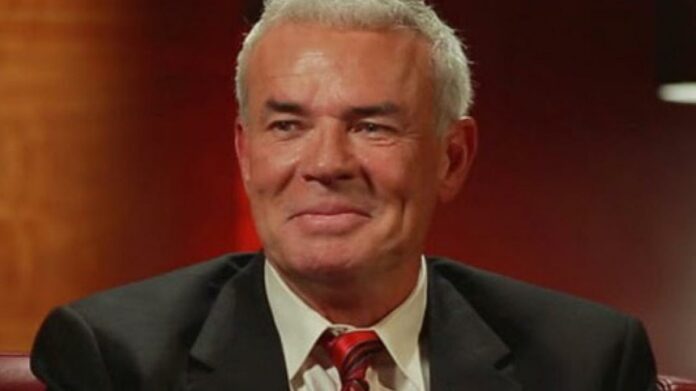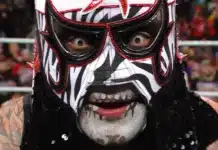
Just over three months after Eric Bischoff was announced as the Executive Director for Smackdown, he was fired earlier this week, replacing him with longtime producer, Bruce Prichard. The move was somewhat surprising, considering that Bischoff was reportedly signed for the role to primarily work with Fox executives when the blue brand moved to that network, but just two weeks into the SD run on Fox, he was released from the company. F4W’s Bryan Alvarez reported that Bischoff relocated to Stanford for this position so that would imply that the decision to fire him was probably more sudden than anything. Either way, Bischoff’s rather brief stint as the a WWE executive might be an indication about the status of the company behind-the-scenes.
Similar to many, I was very surprised when the former president of WCW was announced for a management role in WWE, not because of any lack of knowledge, but rather that Bischoff had been away from the booking aspect of wrestling for several years at that point. More specifically, the last time he had anything to do with the decision-making process of a sports entertainment organization, it was the disastrous TNA run. Granted, that was more because Dixie Carter was useless than anything, but the point being, Bischoff’s major success as an executive of a pro wrestling company was over twenty years ago so most were skeptical about what he could bring to the table in 2019.
This is just my two cents on the situation, but I’d guess there’s probably two explanations for this abrupt exit just two weeks after the Fox debut.
It’s possible that the very public announcement of Paul Heyman and Eric Bischoff as executive directors for the TV shows was just lip service to Fox and the shareholders, the group that management truly serves with its decisions. Bischoff’s name is known in the television industry, both for his accomplishments with Nitro and a series of reality shows nearly a decade ago. So, for the Fox suits that follow the numbers of WWE stock and revenue that only know the name Bischoff for the Nitro ratings in the boom period, perhaps his association was seen as an upside from a corporate perspective.
The job Bischoff actually did while he was under contract the past few months remains somewhat of a mystery, as Smackdown didn’t necessarily have any major shifts in the direction of the show after he was signed, and truthfully, the brand as a whole was more or less on auto pilot prior to the move to Fox because much of the new material was saved for the network debut. Bryan Alvarez reported that his sources backstage were unsure of what Bischoff’s actual role was since Bruce Prichard was considered the lead producer even after the addition of the executive director role for Smackdown. That being said, those reports must be taken with a grain of salt because none of that information was reported by anyone that was directly involved in the meetings. It appears that only Bischoff and those he worked with could really explain the role he had in the past few months.
Considering that Bischoff relocated for this job, and had filed for bankruptcy last year after his production company shut down, it’s doubtful that he would sabotage his chance to work for the WWE again. The marketing machine was in full force for Smackdown’s premiere on Fox at the start of the month, including The Rock’s return to the company to celebrate twenty years of the brand. Obviously, his appearance along with the WWE title match that saw Brock wrestle on television for the first time since his return to the company boosted numbers, generating nearly four million viewers for Fox. Without all the guest stars, last week’s episode saw a drop of a million viewers. Maybe Bischoff was going to be the one to take the blame for the decrease in numbers so that WWE brass had an excuse for the ratings drop? But, a decrease from such a stacked show would’ve been expected so it’s questionable that a one week slip in numbers would lead to a release.
The other possibility for the switch to Prichard as the executive director might be an indication that management is scrambling for a way to maintain numbers on Friday nights. Keep in mind, the stock price can be based on revenue and sponsorships, but also other numbers associated with the company. A slip in ratings isn’t the best optics for an organization that claims it wants to continue to expand distribution. While the mega TV deal secures the group for its five-year duration, the flip side of that is that management is now subject to the pressure of that contract. Don’t get me wrong, Smackdown isn’t going to get cancelled, but Fox definitely paid the $1 billion in rights fees with the expectation of getting a return on that investment through ad revenue.
Along with that, this record-setting contract was supposed to solidify Vince McMahon’s sports entertainment empire as the undisputed leader of the industry, but not only has All Elite Wrestling made waves in the sport, it also won the ratings battle on Wednesday nights. Does that mean AEW could garner better ratings than Raw? No, but it does put another national product on the table for viewers. Despite the level, there’s a form of competition that is currently getting the better of one of Vince’s brands right now, which takes away from the narrative that WWE is the sports entertainment company in the United States.
So, what does this firing really say about Eric Bischoff?
All things considered, it doesn’t really say anything about Bischoff as either a business man or an executive. If he was just the sacrificial lamb from a one week ratings drop then the conclusion of his run was written before he inked the deal as an executive director. If it happens to be WWE scrambling because of the lackluster reaction to its current product or the buzz that AEW received recently then there wasn’t much he could’ve done to avoid getting fired anyway. While such a short time in the role is a little bizarre, it was so brief that not much can really be taken from it. Much of Bischoff’s legacy within pro wrestling will still be that he was the only promoter in the history of the industry that actually had Vince McMahon on the ropes for any major amount of portion of an era. Even the federal government couldn’t square off against Vince the way that Bischoff did. In many respects, Bischoff’s legacy will rightfully be Monday Nitro, and to a lesser extent his on-screen role as the General Manager of Raw in the early 2000s. A three-month tenure in the offices isn’t going to tarnish that. Still, it’s certainly intriguing to see management announcement such key changes in a relatively short amount of time after they finally have some competition in the industry.
What do you think? Comment below with your thoughts, opinions, feedback and anything else that was raised.
Until next week
-Jim LaMotta
E mail [email protected] | You can follow me on Twitter @jimlamotta







